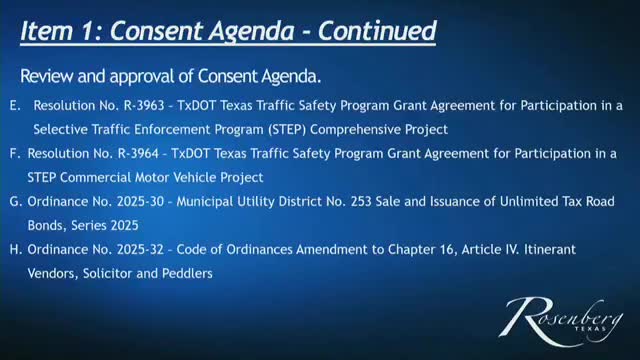Rosenberg council approves tougher door-to-door solicitation law after hour-long public debate
Get AI-powered insights, summaries, and transcripts
Subscribe
Summary
After extensive public comment and council debate, Rosenberg City Council approved Ordinance No. 2025-32 to regulate itinerant vendors, solicitors and peddlers, keeping First Amendment exemptions and a maximum class C fine of $500 while authorizing enforcement focused on companies as well as individual agents.
Rosenberg City Council on Oct. 21 approved Ordinance No. 2025-32, revising the city code for itinerant vendors, solicitors and peddlers to allow the city to regulate and penalize commercial door-to-door solicitation, require permits and hold companies responsible for agents who solicit within city limits.
The ordinance, prepared after citizen complaints about burglaries, fraud and aggressive solicitors, provides a permitting process, recordkeeping requirements for companies using agents, additional holidays when door-to-door sales are not allowed, and a penalty capped at $500 per violation. Councilmembers said they intend enforcement to target companies using agents rather than only individual solicitors, and discussed a “zero tolerance” enforcement approach where officers would issue citations for violations without prior warnings.
The ordinance retains narrow defenses tied to noncommercial First Amendment activities — including religious and political speech and certain charitable/educational civic purposes — a provision staff said mirrors language tested in other Texas ordinances. City staff told the council the language follows models (including a Dallas ordinance) that have been litigated and upheld on constitutional grounds.
The item drew extended public comment. Robbie Conley and other residents urged the council to make the law as restrictive and costly as possible for commercial solicitors, warning about aggressive sales tactics and safety risks to elderly residents. Dr. Dan Ives and Carolyn Seiler likewise urged strict, immediate enforcement with minimum fines and cited repeated return visits by solicitors who had been told not to return.
Council discussion focused on enforcement design: making companies vicariously liable for agents who violate the law, setting permit durations and fees that reflect enforcement costs, and deciding whether to specify a minimum fine. City staff said state law limits some penalty structures but local ordinances may set class C misdemeanor fines (up to $500), and that permit fees must be supported by documented enforcement costs to avoid being treated as a tax. Councilmembers expressed divided views on setting a minimum fine; several said they preferred to leave discretion to the prosecutor while maximizing the allowable penalty where appropriate.
Councilmembers also discussed duration of permits and recordkeeping: staff proposed a certificate of registration that would expire after 90 days (shorter than a comparable Dallas term), and said the proposal allows enforcement against both individual solicitors and the commercial entities that dispatch them. Several council members asked staff to return with defensible cost estimates for an appropriate permit fee at a later meeting.
After discussion, Councilmember Hector moved to approve Ordinance No. 2025-32 as presented; Jessica seconded. The motion passed and the ordinance was adopted.
What the ordinance does and what it does not do: the new text establishes a permit/registration requirement for commercial, door-to-door solicitation; creates recordkeeping requirements and new prohibited days; authorizes fines up to $500 per violation; allows enforcement against companies that hire solicitors; and retains First Amendment defenses for purely religious, political or certain charitable/educational solicitations. It does not change state criminal trespass laws, and it does not itself set a specific minimum fine (the council left prosecutorial discretion intact and discussed but did not set a mandatory minimum). The council directed staff to incorporate a “zero tolerance/no-warning” enforcement provision in the ordinance language as discussed and to return with fee recommendations based on enforcement cost calculations.
The ordinance was the most heavily discussed and contested item of the evening, with multiple residents and neighborhood representatives urging immediate and strict enforcement. City staff and the city attorney told council members the proposed language is modeled on ordinances that have survived constitutional challenge, but council members noted some risk of litigation and agreed that careful, documented enforcement and defensible fee calculations will be important.
The council also asked staff to prioritize enforcement that targets companies and deeper pockets rather than only individual, lower-income solicitors, while preserving prosecutorial discretion. Next steps include publishing the finalized ordinance language with the agreed additions, returning with a proposed permit fee supported by documented enforcement costs, and city staff beginning enforcement once the ordinance becomes effective.
